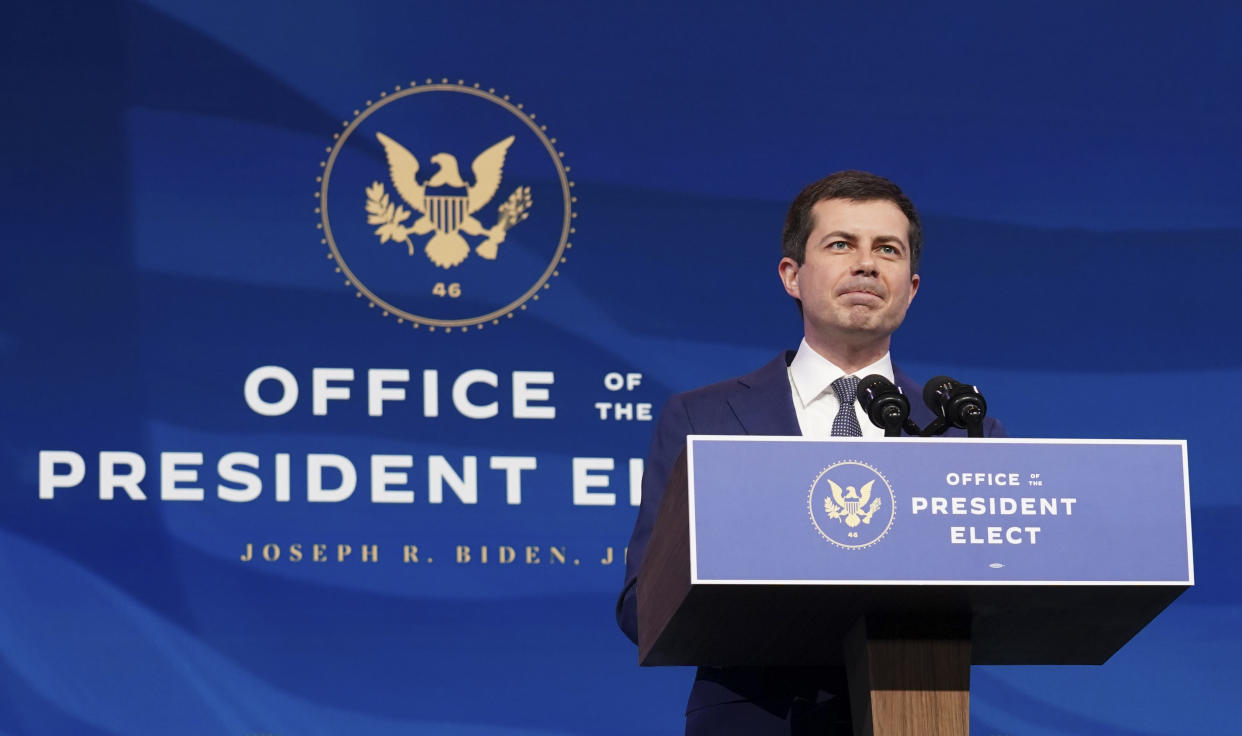How Biden plans to attack climate change
Jennifer Granholm, the former governor of Michigan, argues that green-energy investments are the key to the future of America’s gas-guzzler auto industry. In a November editorial, she pointed out low-carbon energy is one of the fastest-growing industries in Michigan, with jobs that pay 7% more than the median job and are more likely to come with health and retirement benefits.
Incoming President Joe Biden plans to nominate Granholm to be his energy secretary, one of several Biden nominees that reveal how Biden is likely to address climate change. He tapped Gina McCarthy, who ran the Environmental Protection Agency under President Obama, to be White House climate coordinator. Ali Zaidi, climate adviser to New York Gov. Andrew Cuomo, will be her deputy. Former presidential contender Pete Buttigieg will be Biden’s Transportation Secretary, overseeing infrastructure investment and fuel efficiency.
Biden has pledged the most aggressive effort to combat climate change ever, and climate activists are enthused by Biden’s early appointments. “We’re seeing the buildout of a really incredible climate team,” says Christy Goldfuss of the Center for American Progress, who was a top climate advisor in the Obama administration. “A year from now, I think we’ll see real progress on clean air and clean water regulations, and I think there will be a clear climate action plan in place.”

Net-zero by 2050
Biden’s overarching climate goal is net-zero carbon emissions in the United States by 2050, which means removing as much carbon from the atmosphere as we put in, for a net addition of zero carbon. Though 30 years away, this is an aggressive goal that would require major changes in energy production, breakthrough technologies and widespread consumer willingness to change ingrained habits. A recent Princeton University analysis, for instance, found that meeting Biden’s target would require massive new investments starting immediately and unprecedented adoption of new technology, such as electric vehicles.
Biden’s early appointments hint at how he plans to start. McCarthy ran the EPA from 2013 to 2017, when Republicans controlled first one, then both houses of Congress, and President Obama’s agenda faced a dead end on Capitol Hill. McCarthy developed Obama’s Clean Power Plan, which went into effect in 2015, without any Congressional legislation. The plan aimed to cut greenhouse gas emissions from power plants by 32% to 90%, an audacious use of regulatory power to enact climate policy.
Many states sued, and the Supreme Court suspended the Clean Power Plan in 2016. President Trump, who called the plan vast government overreach, killed it after he won the 2016 election, while also weakening many other environmental regulations. After leaving the EPA, McCarthy became president of the Natural Resources Defense Council, which has blocked many Trump rollbacks in court. All of this experience will be useful in the Biden administration. At best, Democrats will emerge from the Jan. 5 runoff elections in Georgia with a one-vote advantage in the Senate, but it’s more likely Republicans retain control. Even a thin Democratic majority would make it hard to get major climate legislation through Congress. So Biden will probably have to rely upon executive action, much as Obama did.

Granholm was Michigan governor from 2003 to 2011, a period of decline for the Detroit 3 automakers that ended with the bankruptcy of General Motors and Chrysler in 2009. Granholm has talked with frustration of watching Michigan factories close, with little recourse, even as governor. As part of their revival, the Detroit automakers have begun to embrace electric vehicle technology, and General Motors (GM) recently scrapped its participation in a Trump administration lawsuit aimed at forcing California to lower its fuel-economy standards, which are higher than federal rules. Granholm will presumably use her knowledge of the auto industry to help develop a national strategy for vehicle electrification and other forms of clean energy, which would be a first for the United States.
For Interior Secretary, Biden has chosen Rep. Deborah Haaland of New Mexico, who backs the Green New Deal and favors a ban on energy drilling on public lands. Interior would be the agency that enforces such a ban, if Biden imposes it. Biden’s pick to run the EPA is reportedly Michael Regan, a veteran of the EPA under Presidents Clinton and George W. Bush. He’s currently the top environmental regulator in North Carolina, where he hammered out pollution-cleanup settlements with Duke Energy and other companies.
Going beyond Obama
Unlike those appointees, Buttigieg has little experience with energy or transportation, although he says dealing with floods as mayor of South Bend, Ind., put him on the front lines of climate change. Transportation Secretary is often a back-bench Cabinet job offered to an aging party loyalist, but Biden probably wants to tap Buttigieg’s popularity as a whip-smart, vanguard millennial who can inspire passion on wonky issues like climate policy (and argue convincingly on Fox News). Buttigieg is clearly going places, and as a national surrogate for Biden on climate policy, he’d help draw younger voters to the cause while advancing his own interests.
Biden will probably develop a detailed climate policy by the magical 100th day in office, with an emphasis on going beyond Obama by making carbon-reduction a key priority of every federal agency. Early actions will probably focus on rolling back Trump policies, such as the weakening of air and water pollution rules involving greenhouse gases but also mercury and other pollutants. The Biden administration will almost certainly drop the Trump lawsuit against California, which will allow it and a dozen other states to continue to set their own fuel economy rules higher than the federal standards.
Beyond that are likely to be efforts to restore the Clean Power Plan targets and perhaps go further, in ways that are less likely to get tangled in court. Granholm, for instance, has talked about creating incentives, like federal and private-sector grants, for states to lower carbon emissions, instead of ordering them to and inviting litigation. There could be new incentives to adopt wind and solar power and perhaps bipartisan Congressional legislation. Biden has one advantage over Obama, since more and more Americans continue to favor action on climate change, and that is filtering through to elected officials. They may finally be poised to do something.
Rick Newman is the author of four books, including “Rebounders: How Winners Pivot from Setback to Success.” Follow him on Twitter: @rickjnewman. Confidential tip line: rickjnewman@yahoo.com. Click here to get Rick’s stories by email.
Read more:
Get the latest financial and business news from Yahoo Finance
Follow Yahoo Finance on Twitter, Facebook, Instagram, Flipboard, SmartNews, LinkedIn, YouTube, and reddit.
